Being a refugee and having gone through the devastation of having to flee his country and start from scratch in a new land has not robbed Afghan playwright/theatre director Saleh Sepas of his zest for life, his kindness for others, or his hope for the future.
After two long years of prep (interspersed with stop/starts due to the pandemic), Saleh’s new play And Then Came Spring – a collaboration with Instant Cafe Theatre – is set to be staged from July 22-24 at the Damansara Performing Arts Centre (DPAC) in Petaling Jaya, Selangor.





